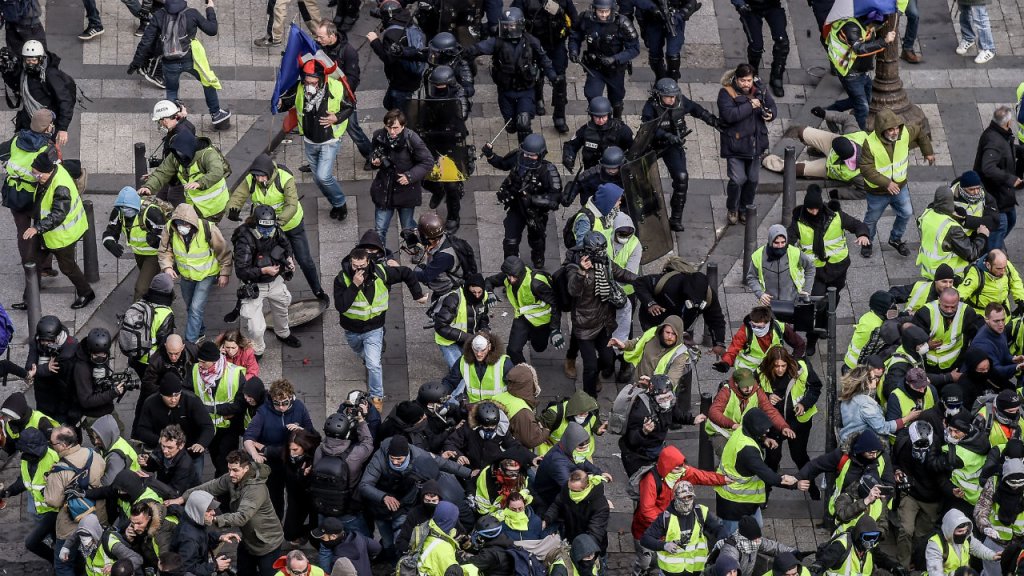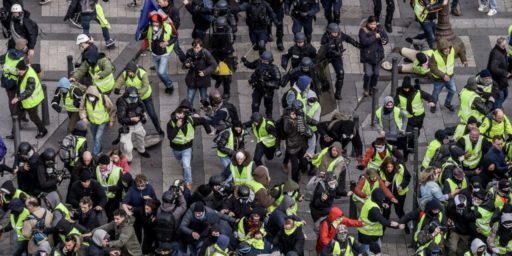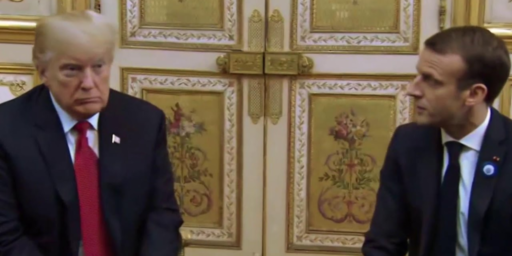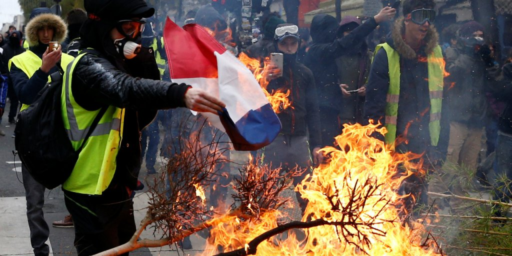France’s Yellow Vest Riots Enter Fifth Week
Protests that have killed four and injured hundreds have been rewarded and show no sign of ending.

Mass protests, sometimes violent, in France are wildly popular and gaining steam.
NYT (“‘Yellow Vests’ Descend on Paris as Police Arrest Hundreds and Fire Tear Gas“):
Thousands of demonstrators descended on Paris early Saturday, as residents braced for more mayhem and the police turned out in force, blocking access to main arteries and monuments that had been the focus last week of France’s worst urban violence in decades.
About an hour into a tense but otherwise peaceful demonstration, the police fired an initial tear-gas volley, as the so-called Yellow Vests protesters attempted to charge a cordon blocking a side street off the Champs-Élysées, where other protesters milled about.
The scenes were punctuated by shouts of “Macron Resign!” — a reference to President Emmanuel Macron, who has become a focus of anger — impromptu bursts of the French national anthem, “The Marseillaise,” and curses spat at the police and members of the news media.
The police quickly swept up and arrested nearly 500 demonstrators.
A line of eight police vehicles blocked access to the Arc de Triomphe, a quasi-sacred national symbol and that was defaced last weekend. The police also hemmed in demonstrators at the other end of the Champs-Élysées, near the seat of the French presidency and the Place de la Concorde.
Police detachments were set up at all major central Paris intersections. Shops on the Champs-Élysées were shuttered, and most monuments and museums were closed, even those far from the protest areas, including the Eiffel Tower, the Louvre and the Musée d’Orsay. Residents of many wealthier neighborhoods left the city as a precaution.
The government has been warning of a potential increase in violence from the vandals or casseurs, literally “breakers,” who habitually attach themselves to French streets protests.
There was great fear on Saturday that those more hard-core and violent elements would hijack the Yellow Vests demonstrations, whose ranks were initially filled by members of the working poor from rural areas dismayed by a planned increase in a gasoline tax. Their demonstrations were named for the fluorescent yellow hazard vests adopted by the protesters as a sign of their distress.
The French government eventually suspended the planned gas tax increase before canceling it outright. But that did not quell the outrage, which has morphed into much broader anger at Mr. Macron’s economic and social policies, and France’s declining living standards.
The motivations of the protesters have not changed from previous weekends, nor has their determination.
“We drove all night,” said Julien Lezer, an electrician from the Var region, on the Mediterranean. “We don’t agree with the current system anymore; it doesn’t represent us. It’s not in the regions that things change; it’s in Paris. It’s when the people from the regions go to Paris that the politicians listen.”
Reuters (“French police clash with ‘yellow vest’ protesters on Champs Elysees“):
French riot police fired tear gas canisters at “yellow vest” protesters in central Paris on Saturday at the start of a planned demonstration against the high cost of living under President Emmanuel Macron.
A police spokeswoman told reporters there were about 1,500 protesters on the Champs Elysees boulevard and authorities said 211 people had been arrested after police found weapons such as hammers, baseball bats and metal petanque balls on them.
Hundreds of protesters were milling around the Arc de Triomphe monument, which was defaced with graffiti last Saturday, when rioters also torched cars and looted shops.
“We will do all we can so that today can be a day without violence, so that the dialogue that we started this week can continue in the best possible circumstances,” Prime Minister Edouard Philippe said on French television.
On Tuesday Philippe announced the government was suspending planned increases to fuel taxes for at least six months to help defuse weeks of protests, the first U-turn by Macron since he came to power 18 months ago.
About 89,000 police were deployed across France on Saturday, some 8,000 of them in Paris.
“We have prepared a robust response,” Interior Minister Christophe Castaner told online news site Brut. He called on peaceful protesters not to get mixed up with “hooligans”.
“The troublemakers can only be effective when they disguise themselves as yellow vests. Violence is never a good way to get what you want. Now is the time for discussion,” he said.
“If you are not aggressive, we will not be aggressive, a masked policeman said as a protester stuck yellow plastic flowers onto policemen.
Much of Paris looked like a ghost town on Saturday, with museums, department stores closed on what should have been a festive pre-Christmas shopping day.
Tourists were few and residents were advised to stay at home if at all possible. Dozens of streets were closed to traffic, while the Eiffel Tower and world-famous museums such as the Musee d’Orsay, the Centre Pompidou and the Louvre were shut.
Many shops were boarded up to avoid looting and street furniture and construction site materials have been removed to prevent them from being used as projectiles.
NBC (“Paris braced for new riots as ‘Yellow Jacket’ protests sweep France“):
The French capital was shut down on Saturday as the city braced itself for what many fear will be the most violent protests in weeks of forceful anti-government demonstrations that have swept the country.
Protests that began last month against planned tax hikes on gas have since morphed into a wider rebuke of Emmanuel Macron’s presidency and an expression of anger at his attempts to reform France’s long-ailing economy.
Almost eight in ten people in France support the protests, according to a poll published last week.
Paris was largely deserted on Saturday morning as riot police waited on street corners and the first streams of protesters walked toward the Champs-Elysees, chanting the country’s iconic national anthem and waving the tricolor flag as they passed the presidential palace.
Store fronts along the world-famous street — the scene of last week’s clashes between demonstrators and police — were barricaded behind plywood sheets in preparation for yet more violence.
[…]
Paris’s glittering museums and galleries — including the Louvre and the Eiffel Tower — said they would not open their doors to the usual troop of holiday season tourists.
Soccer matches have also been called off across the country.
As Parisians prepared for what looked to be another weekend of destruction, the vast majority who spoke to NBC News on Friday said they supported the grievances of the so-called Yellow Jackets.
While many said they were perturbed by the protests’ escalating violence, they also said they shared the demonstrators’ frustrations. Namely, the high-cost of living in France and Macron’s appetite for reform.
“There is great anger in France at the moment,” said André Rubinot, a retired baker whose old boulangerie stands in the shadow of the Eiffel Tower.
“The president has too many reforms and he is going about them too quickly without asking anyone — quick, quick, quick,” he said.
Like others, Rubinot lamented that life had become too expensive as he ticked off different household goods that had gone up in price. “A baguette is now one euro 20 cents,” ($1.36) said the 68-year-old in disbelief.
The French have a tendency for fiercely opposing reform and quickly falling out of love with their presidents.
Macron, a former investment banker who swept to power on a reformist agenda, was supposed to be different.
The young centrist pledged to overhaul the country’s generous welfare state, which redistributes wealth across society with high taxes for the rich.
France has high levels of social security and workers’ rights, making it difficult to enact business-friendly reforms in spite of persistent unemployment.
But while he’s enjoyed a high profile on the global stage, he has struggled to pass legislation at the heart of his domestic agenda.
Joseph Downing, an expert in French politics at the London School of Economics, agreed that the protests were about “much more” than taxes on gas.
“It’s this entire idea of the squeezed middle or the squeezed upper working-class person who feels an entitlement to an ever-increasing standard of living but is something that no politician can deliver,” he said.
“This is where we’ve seen disenfranchisement with Sarkozy, with Hollande and now with Macron.”
The self-organized approach of the protest, which sprung up from the depths of social media, is also a relatively new phenomenon in France where people have historically relied on the powerful unions to organize discontent.
Several people who spoke to NBC News said the strength of the “Yellow Jackets” lies in the fact that the protest isn’t specifically linked to any political party or union and has therefore united swathes of the population.
“The politicians are afraid because they don’t know how to stop it,” said Julian Guillo, a 23-year-old property student. “It’s not one organization, it’s the people.”
There’s no small irony in a movement complaining about the high cost of living shutting down the economy during the peak season. But what most strikes me is the notion that a democratically-elected government ought be held hostage by rioters and engage them in “conversation.” But, having already capitulated to some of their demands, there’s no incentive for the mobs to quit now.
Of course, as an unsigned France 24 report (“Aux barricades! France’s long history of revolt“) notes, this is hardly unprecedented.
During the 1789 Revolution that began with the storming of the Bastille, French workers rioted over taxes, economic inequality and perceptions that the country’s rulers were out of touch.
And it seems President Emmanuel Macron has ignited this same spark, rekindling the French citizenry’s rebellious tendencies. While democracy has replaced the monarchy in France, the tradition of the masses taking their anger against perceived inequality onto the streets of Paris remains much the same.
Last weekend Yellow Vest protesters were responsible for Paris’s worst rioting in decades, looting and torching cars in plush neighbourhoods near the Champs-Élysées and graffitiing “Macron=Louis 16” and “King Macron”. Four people have been killed and hundreds have been injured in the protests.
Macron, a former Rothschild banker whom critics have long accused of being a “friend of the rich”, stoked popular anger for doing away with a wealth tax last year and proposing a rise in fuel taxes that campaigners say will hurt the poorest.
“We have all kinds of different social categories that have united under what we call ‘The People’, which has deep roots in French history,” sociologist Michel Fize told FRANCE 24 on the eve of new protests. “It’s become a very inclusive movement.”
He noted that unions representing students, farmers and truck drivers have recently joined the struggle.
“There’s reason to believe that other groups will join in too, because all social categories are affected by modern-day social injustice,” Fize said.
And the Yellow Vests have widespread backing. In a survey conducted by the Elabe institute for broadcaster BFMTV earlier this week, 46 percent of the French say they “support” them while 26 percent “sympathise” with their cause.
On Wednesday the French president caved. Macron abandoned the fuel-tax hike, but not before his image as an unshakeable leader was severely damaged.
“If people compare Macron to Louis XVI, it’s a warning that he has hasn’t learned the lesson of history,” sociologist Michel Wieviorka told the Associated Press. “They don’t literally want his head, but it’s a strong message that they don’t feel listened to.”
The concessions haven’t appeased the protesters, who said it was too little too late. With wages stagnant, unemployment above 9 percent and growing frustration at France’s taxes, which are among the highest in Europe, some Yellow Vests now want to topple the government.
Protest may be such a recurrent part of French history simply because it has often succeeded.
[…]
Fifty years ago, students at Sorbonne University erected barricades in a challenge to the status quo. The violence that authorities used to suppress the protesters brought French workers onto the streets, and the swelling 1968 movement that eventually numbered 9 million people brought France to its knees.
The uprising led to a 35 percent rise in the minimum wage and salary increases of 10 percent. But it undermined the legitimacy of president Charles de Gaulle, who stood down the following year.
Mass demonstrations also forced the French government to ditch plans to reform the university selection process in 1986, the reform of public transport workers’ pensions in 1995 and the introduction of a lower wage scale for recent university graduates in 2006.
“There is indeed a stronger culture of taking to the streets to protest in France than in many other countries. It’s due to our political history,” French Sociologist Laurent Mucchielli told FRANCE 24.
“It’s the counterparty to the way we are governed,” he continued. “In the past we were ruled by an absolute monarchy and today by a presidential regime. When there is no citizen participation, or citizens aren’t consulted [on important decisions], with someone always making decisions for them, you come to the point where the only way to react is to protest.”
While one understands general frustration across Western democracies with the failure of the system to continually provide ever-better living standards, the specific grievances fueling these protests mystify me.
That a newly-elected government would seek to quickly enact the agenda on which it ran is hardly shocking. Indeed, one would think the opposite would spark outrage.
The fuel tax, which Macron rescinded to appease the rioters, was indeed regressive. The intent, however, wasn’t so much revenue-generation as an attempt to reduce pollution to meet agreed-to standards to combat climate change. It’s not clear what Plan B will be.
It’s true that the French governing system is less responsive than many Western democracies, giving enormous power to the President and comparatively little to the parliament and premier. But that comes with more accountability. In the American system, a President can blame a recalcitrant Congress and Congress can blame the President. Not so much in France.
While the office is quite powerful, it’s not clear to me what it is that Macron is supposed to do about a baguette costing $1.38. That doesn’t seem particularly high to me; indeed, that’s about what they go for at my local supermarket.
One would think that having the country’s biggest and most important city shut down for weeks on end by a mob would grow tiresome. But, thus far, the movement, such as it is, seems to be gaining in popularity.






Societies are fragile, and the great Achilles Heel of democratic societies, as Aristotle made explicit, is inequality. It is a mistake thinking this is about commodity prices of baguettes, or that it’s even about Macron. It’s about a system people hate, and the only way to change a system ruled by a small group of people, as France is, is through violence. You may recall the French have been deeply dissatisfied with their government for over a decade now, with each President promising to fix the problems and never actually doing it.
I will also point out that Americans were a mob too in the years leading to the Revolution, kidnapping, torturing and dispossessing Royalists. This sort of thing is inevitable in a system which refuses to deal with its contradictions.
FWIW, there is some evidence that at least some of what’s going on here is being fueled by Russian interference not unlike what happened in the U.S.
Also, it’s worth noting that France is a nation of 67,000,000, that Paris has a population of roughly 2,200,000. By all estimates these protests are made up of at best a few thousand people.
Yes, Doug. Grab onto any distraction you can find. The best is, as always, The Magic Russian Mind Control Machine that dates from the 1950s. Anything to evade acknowledging that people can have their own opinions, that differ from your own.
@Ben Wolf: But that was almost 250 years ago in a non-democratic society throwing off rule by a monarchy 3000 miles away. This is a democratically-elected government enacting the platform on which it was elected.
@Doug Mataconis: Yup, the Russians are helping fuel the fire. But I think the grievances themselves are genuine and the reaction very much French.
@Ben Wolf:
And please tell us exactly how you know what is motivating the French voters or at the very least the tiny segment of the French population that is driving these protests.
I have not expressed an opinion about what’s going on in France in no small part because I don’t feel I’m well-informed enough to do so. I do know one thing, though. In a democratic society, violence is never the answer.
You just stated the Russians and a “tiny” segment are “driving.” So spare me the “I don’t know enough to comment” nonsense. You already did. Also, we can know why they’re doing what they’re doing, because they are telling us loudly as possible. Stop with the Russian fantasies and listen. That support for these protests tracks very strongly with economic class is a huge red flag this is representative of a systemic problem.
That’s a nice little slogan, but the historical record tells us something very different.
@James Joyner: Humans aren’t any different today than they were 250 years ago. If they feel alienated, they will behave violently. There’s a huge body of sociological research that supports this. You can simply go back to Durkheim and his concept of anomie to find that this problem was recognized in the 19th Century.
If we’re talking about “oughts” though, if you’re going to protest, you ought to do it just like this. Democratically-elected governments are not always responsive to the electorate, thinking their “accountability moment” comes only on election day. We live in a world where states are literally murdering people, where our own government is putting children into camps and threatening to shoot asylum seekers. Politicians are scared? Maybe they should be.
(Also this should be a cautionary tale about the downsides of certain policy preferences. We may be facing the last generation of combustion engines in cars, so regressive fuel taxes may not be what the world needs.)
@Ben Wolf: Well, as crowd control goes there is the U.S. military’s shining example from not terribly long ago. In July of ’32 Gen MacArthur led tanks and old-fashioned horse cavalry to dispatch the Bonus Army (with Eisenhower and Patton alongside playing Tonto). So there’s that.
From the interviews I’ve seen and read of the demonstrators they sound like American Trumpies. The elites and urbanites have been running things and don’t appreciate the difficulties of life in the provinces. “I live on the wrong side of the mountain,” one said meaning that his life was much MUCH more affected by the gas tax than the Parisiennes who have the option of public transportation.
Since France has a centuries-long history of having troublesome relationships between the provinces and Paris, I’m not so sure that there is a new story here.
And I bet the May ’68 riots were more significant in every way.
@Ben Wolf:
My citation to the numbers was nothing more than an effort to put these protests into perspective. You seem convinced that these protesters represent the majority of the French population, or a majority of the electorate. I don’t see the evidence supporting that assertion (and no, your claims are not self-evident or self-proving).
So, if you have evidence to support your apparent claim that these protests represent the majority of the public, please share it.
@James Joyner:
The odd thing to me about all of this that the protests are about higher prices. Granted, the government in France is far more involved in the economy (arguably far more than it ought to be) than the U.S. Government is in our economy. That being said, though, if I notice that the price of bread has increased my first instinct isn’t to march to Washington and demand that the President, Congress, or the Supreme Court do something about it.
Perhaps it is something very French about all this, but in that case it tells me there’s something wrong with the way some segment(s) of French society view the nation they live in.
@Doug Mataconis:
To be fair, this was in the NBC story linked above:
@James Pearce:
Fair point, but that doesn’t mean they support the violence. Our friend Ben clearly does, which I think says more about him than it does the French electorate.
The other point is that the protests were originally about the fuel tax increases, which have been repealed. Now that that’s the case what, exactly, are these people protesting? Or is this just a case of protest for its own sake?
@Ben Wolf: I mean this respectfully: where do your ideas come from? Are you in France? Are you comfortable in French? Have you studied French history? On the internet it is often hard to tell the difference between real experts and people who just have opinions.
I can read French a little, but my reading of Paris newspapers is not good enough to form an opinion. I am acquainted with an expat living in Paris, but he is too weird to be reliable. The German news media are reporting this stuff like a weather report without much analysis.
In fairness to Mr. (or should I say M.) Wolf, some display of credentials from commentators would help.
I have a strong belief in nonviolence as a generality.
@Doug Mataconis:
Or a lack of wage growth, obviously.
Quite a few French workers have noticed that their wages have remained flat, while daily necessities now cost more. The concept of rising prices is easier to grasp than stagnating purchasing power.
While the French are richer than even twenty years ago, the distribution of the pie is now different. Some feel – correctly – that are being left behind.
Additionally, rural areas are slowly dying – or at least offering fewer and fewer opportunities; and while you obviously can still make a living in a small town, the high-quality jobs are in the big cities – Paris especially. And there’s another reason why some people feel left behind.
Perhaps most importantly, there’s a lot less security with regards to income, jobs, retirement benefits, social status, etc. than even a generation ago. It’s much easier than it used to be to end up on a lower rung of the social ladder.
In short, a lot of frustrations – some more justified than others – are coming together in these protests.
It should also be noted that quite a bit of this should be pretty recognizable, even though the French have their own particular way of expressing their concerns.
This analysis by French social geographer Christophe Guilluy rings true:
The gilets jaunes protests are spreading to Belgium and the Netherlands as well, cf. https://kdkaradio.radio.com/articles/yellow-vest-protests-grow-belgium-netherlands also https://www.politico.eu/article/brussels-braces-for-yellow-jacket-protest/
I don’t know what’s fueling the protests but, as I noted in my posts on them, I think they are qualitatively different from the other protests in France of the last quarter century. Their demographics are different. I don’t believe they are either left or right in their politics. More elitist vs. anti-elitist.
@Doug Mataconis:
But maybe it does? The yellow vesters were clashing with police on the second day of the protest, back in November. A new poll, after all the violence, might show that support has gone down, but at this point, if someone supports the yellow vesters, it’s likely they at least tolerate the violence.
No idea, but I don’t look for coherence in a mob of protesters.
Anyone know what are Macron’s political opponents are saying?
@Doug Mataconis:
When a government fails to meet the needs of the people, and fails to listen to them, violence is part of the answer. At the very least, the threat of violence. Democratic government or not.
This is why I have long opposed “free speech zones” that are set up to ensure that those being protested don’t have to deal with the hassle of protesters.
Example from recent US history — we are currently in the midst of a culture change on police violence, particularly towards African-Americans. Would this have happened without riots and burning down the occasional CVS?
You want to say yes. I want to say yes. Peaceful protests should have made this happen, but there have been peaceful protests for years that were ignored by the bulk of society. It took riots to get news coverage, and news coverage to reach the white folks who weren’t as affected.
Black Lives Matter doesn’t take hold in the US without some violence. That’s a problem with how the US treats protests. I’m glad the violence has been minor, and basically limited to property damage.
Even Martin Luther King would not have been successful without violence. The police supplied the violence in his case, but it was the images of protesters being beaten, and attacked with fire hoses and dogs that finally set in. It was the revipulsion to the violence that changed America.
This is similar to the cite that drj gives above.
I fear violence because it favors the strong and ruthless over calm thinkers.
@Doug Mataconis:
True, but French history shows that Paris punches well above its weight. Not enough to drive events nationally all on its own, but enough to direct them.
Maybe what was true in the 1780s, 1830s, 1840s, 1850s, and 1960s is no longer so now. But I’d be wary.
@Doug Mataconis: 1-) That’s not odd. Many large scale demonstrations begins because of relatively small things. The huge demonstrations of 2013 in Brazil began because of transit fare increase, in some days it was clear that the demonstrators were not motivated anymore only by the transit fare increase.
2-) The most interesting thing is the reaction of people when White people, not people of African or Arab ancestry, are vandalizing European cities.
@Doug Mataconis:
Paris Metropolitan Region(Île-de-France) has 12 million people. And there are demonstrations in Toulouse, Bordeaux and other French cities.
Just finished a fairly brief article in the NYMag Intelligencer section (‘What Will Follow Emanuel Macron?’ – Sarah Jones). Very informative in many ways. Too full of explanatory data points to summarize.
“These riots are the result of top down management” (CNN)
Policies and taxes hit the working class and middle income base that keeps the country going. Macron needs to get in touch with the people. Gas taxes and UN treaty regulations are not going to work.
In the US gas consumption continues to decrease. The newer vehicles get better mileage. My relative’s new suv has a v6 motor and gets better mileage than my old 4 cylinder Camry. There is a good lesson there. The American people are doing their part.
I filled up yesterday: $1.88/gal. ! I ‘ll take that. These low gas prices are helping out the working people – an early Christmas present.
“Mueller who?”